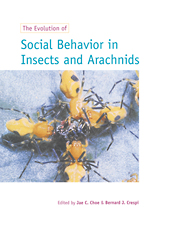Book contents
- Frontmatter
- Contents
- Contributors
- Acknowledgements
- Introduction
- 1 Are behavioral classifications blinders to studying natural variation?
- 2 Life beneath silk walls: a review of the primitively social Embiidina
- 3 Postovulation parental investment and parental care in cockroaches
- 4 The spectrum of eusociality in termites
- 5 Maternal care in the Hemiptera: ancestry, alternatives, and current adaptive value
- 6 Evolution of paternal care in the giant water bugs (Heteroptera: Belostomatidae)
- 7 The evolution of sociality in aphids: a clone's-eye view
- 8 Ecology and evolution of social behavior among Australian gall thrips and their allies
- 9 Interactions among males, females and offspring in bark and ambrosia beetles: the significance of living in tunnels for the evolution of social behavior
- 10 Biparental care and social evolution in burying beetles: lessons from the larder
- 11 Subsocial behavior in Scarabaeinae beetles
- 12 The evolution of social behavior in Passalidae (Coleoptera)
- 13 The evolution of social behavior in the augochlorine sweat bees (Hymenoptera: Halictidae) based on a phylogenetic analysis of the genera
- 14 Demography and sociality in halictine bees (Hymenoptera: Halictidae)
- 15 Behavioral environments of sweat bees (Halictinae) in relation to variability in social organization
- 16 Intrinsic and extrinsic factors associated with social evolution in allodapine bees
- 17 Cooperative breeding in wasps and vertebrates: the role of ecological constraints
- 18 Morphologically ‘primitive’ ants: comparative review of social characters, and the importance of queen–worker dimorphism
- 19 Social conflict and cooperation among founding queens in ants (Hymenoptera: Formicidae)
- 20 Social evolution in the Lepidoptera: ecological context and communication in larval societies
- 21 Sociality and kin selection in Acari
- 22 Colonial web-building spiders: balancing the costs and benefits of group-living
- 23 Causes and consequences of cooperation and permanent-sociality in spiders
- 24 Explanation and evolution of social systems
- Organism index
- Subject index
15 - Behavioral environments of sweat bees (Halictinae) in relation to variability in social organization
Published online by Cambridge University Press: 06 July 2010
- Frontmatter
- Contents
- Contributors
- Acknowledgements
- Introduction
- 1 Are behavioral classifications blinders to studying natural variation?
- 2 Life beneath silk walls: a review of the primitively social Embiidina
- 3 Postovulation parental investment and parental care in cockroaches
- 4 The spectrum of eusociality in termites
- 5 Maternal care in the Hemiptera: ancestry, alternatives, and current adaptive value
- 6 Evolution of paternal care in the giant water bugs (Heteroptera: Belostomatidae)
- 7 The evolution of sociality in aphids: a clone's-eye view
- 8 Ecology and evolution of social behavior among Australian gall thrips and their allies
- 9 Interactions among males, females and offspring in bark and ambrosia beetles: the significance of living in tunnels for the evolution of social behavior
- 10 Biparental care and social evolution in burying beetles: lessons from the larder
- 11 Subsocial behavior in Scarabaeinae beetles
- 12 The evolution of social behavior in Passalidae (Coleoptera)
- 13 The evolution of social behavior in the augochlorine sweat bees (Hymenoptera: Halictidae) based on a phylogenetic analysis of the genera
- 14 Demography and sociality in halictine bees (Hymenoptera: Halictidae)
- 15 Behavioral environments of sweat bees (Halictinae) in relation to variability in social organization
- 16 Intrinsic and extrinsic factors associated with social evolution in allodapine bees
- 17 Cooperative breeding in wasps and vertebrates: the role of ecological constraints
- 18 Morphologically ‘primitive’ ants: comparative review of social characters, and the importance of queen–worker dimorphism
- 19 Social conflict and cooperation among founding queens in ants (Hymenoptera: Formicidae)
- 20 Social evolution in the Lepidoptera: ecological context and communication in larval societies
- 21 Sociality and kin selection in Acari
- 22 Colonial web-building spiders: balancing the costs and benefits of group-living
- 23 Causes and consequences of cooperation and permanent-sociality in spiders
- 24 Explanation and evolution of social systems
- Organism index
- Subject index
Summary
Do you know the Halicti? Perhaps not … [T]hese humble creatures with no history can tell us some very singular things; and their acquaintance is not to be disdained if we would enlarge our ideas upon the bewildering swarm of this world.
Jean Henri Fabre (1915, p. 365)ABSTRACT
An overview of variability in social behavior of sweat bees shows why a consideration of environmental influences helps us understand the current distribution of halictine social behavior and how it evolved. The breadth of reaction norms for social behavior apparently varies among species, based on limited information. Conspecific attraction, mutual tolerance and group–living occur within lineages of solitary sweat bees, providing opportunities to study weakly or undifferentiated social organizations, analogous to early phases of social evolution. Perceptual capabilities to manipulate social environments are reviewed, but there is insufficient evidence to determine whether such capabilities constrain social organizations. Hypotheses relating to the importance of natural enemies for the expression of social behavior are also reviewed, but again pertinent data are scarce.
INTRODUCTION
Hamilton (1964,1972) enlarged our concept of reproductive behavior by taking into account a kinship–weighted fraction of offspring produced by collateral relatives. This gene's–eye view of reproduction clarified certain features of animal societies and their evolution, as discussed elsewhere in this volume (see also Gadagkar 1991; Mueller 1991). Similarly, we need to enlarge our concept of ‘the environment’.
Information
- Type
- Chapter
- Information
- The Evolution of Social Behaviour in Insects and Arachnids , pp. 316 - 332Publisher: Cambridge University PressPrint publication year: 1997
Accessibility standard: Unknown
Why this information is here
This section outlines the accessibility features of this content - including support for screen readers, full keyboard navigation and high-contrast display options. This may not be relevant for you.Accessibility Information
- 42
- Cited by
